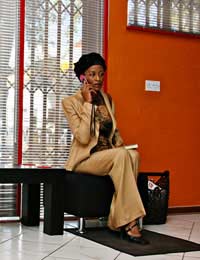Support if You are a Witness to a Crime

Most of the cases that come before the courts don't actually require the witnesses to the crime to go to court to give their evidence. When the police interviewed you they would have taken a full statement. Both the defence and prosecution lawyers will decide if they need to ask you any further questions that will require that you appear at the court in person.
If you are called to court as a witness there are few ways you can get out of not appearing. However, if you can produce a doctor's note that clearly states that you have a medical condition that prevents you from coming to court, you may be excused a court appearance. Remember that if you are summoned to court as a witness you must appear. If you don't you could be arrested, fined and even sent to prison as failure to appear is contempt of court, which is a serious offence.
Being a Witness
When you report a crime to the police they may ask you come to the police station to look at photographs of convicted criminals to try and identify the person or persons you witnessed committing the crime. You may also be asked to take part in an identity parade. This is completely anonymous, as the people in the parade can't see you. Before you leave the police station you will be given a leaflet called 'Witness in Court' that is produced by the Home Office. You can download a copy from the Home Office website at: www.homeoffice.gov.uk/documents/witness.pdf.Criminal cases will usually go before a magistrates' court, but more serious crimes could be sent to the Crown Court. If you are called to the Crown Court, you will have to give your evidence before a judge and jury. You should only have to go to court once to give your evidence unless the courts ruling is appealed against in which case if a new trial is ordered, you may have to give your evidence again.
Going to Court
One the day you have to give your evidence make sure you:- Arrive at the court with plenty of time. The letter from the court will have informed you, date and time of your case.
- Dress smartly.
- Take something to read or otherwise occupy your time as you could be waiting for some time for your case to be heard.
- Take a friend. Going to court can be very traumatic. If you don't have a friend that can go with you, the Witness Support program can help you.
- Take some money, as you will need to buy refreshments throughout the day.
Witness Support
The thought of standing in court and giving evidence can be a daunting prospect for most people. To help people cope with being a witness, the Witness Support Service run by Victim Support can help you before, during and after you have given your evidence. There is a Witness Support service across the UK. You can get contact details on their website at: www.victimsupport.org.uk. In Scotland you can call the Victim Support helpline that can give you information about witness support on: 0845 6039 213.Young Witnesses
Being a witness in court can be a very traumatic experience for children. The NSPCC's Young Witness Support program can help children when they are faced with a court hearing in a criminal case. Their help is impartial in that they focus on the needs of the child and have no knowledge of the cases that the child is a witness in. The service also supports the child after the trial has ended as children may have issues that they still need support dealing with. You can get more information about this service by telephoning: 0808 800 5000.Very young witnesses are often given the chance to give their testimony via video link. This is to protect the child from any excessive stress as they give their evidence. You should ask your solicitor or Victim support about how this system works and if your child could benefit by using a video link.


Re: Information About Employment Tribunal
Hello courtroomadvice.co.uk, Is your website not attracting the traffic or leads it deserves? Would you mind if…
Re: Pre-Sentence Reports
Hello, Farheen. The correct answer to your question is, no. We can not shed any light on the reasons why you son's solicitor thinks that his…
Re: Pre-Sentence Reports
Hello Rodney, you went through the police interview wirhout a solicitor? Or used the duty solicitor? You've had your probation interview?…
Re: Pre-Sentence Reports
Hello, Farheen. It is not clear what you mean when you say that an incorrect law has been used. Incidentally, being unable to communicate is…
Re: Pre-Sentence Reports
My case was adjourned and I have now had my interview with the probation officer. Given that most magistrates courts take the PSR and…
Re: Pre-Sentence Reports
My son has a pre sentence report interview. My son cannot communicate and has mental health issues. The solictor has will submit an appeal…
Re: Failure to Attend Jury Service
I did jury service in Cardiff Crown years and years ago. I was called into court on the jury. I had 3 cases all dead boring. I…
Re: A Guide to Court Orders
Please please if there’s any advice,support or anything else you can help with please let me know, I fled the former marital home in…
Re: Pre-Sentence Reports
Hello Emz, I can understand family and health questions. They seem quite reasonable. The focus on eye problems is a bit of a mystery to me,…
Re: Pre-Sentence Reports
Could anyone help I had a presentence report done and they asked me loads of questions about my kids and partner and also if I have any…